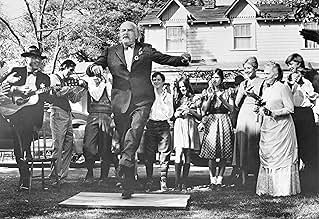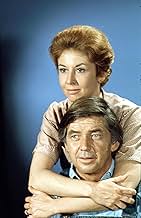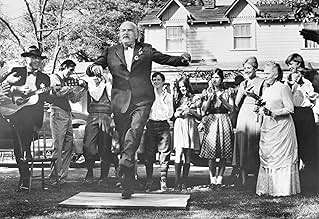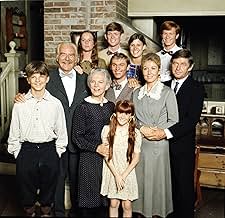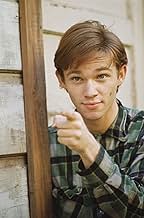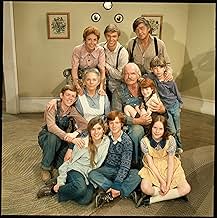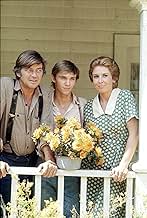La vie et les épreuves d'une famille de montagnards en Virginie dans les années 1930 et 1940 lors de la dépression économique et la Seconde Guerre mondiale.La vie et les épreuves d'une famille de montagnards en Virginie dans les années 1930 et 1940 lors de la dépression économique et la Seconde Guerre mondiale.La vie et les épreuves d'une famille de montagnards en Virginie dans les années 1930 et 1940 lors de la dépression économique et la Seconde Guerre mondiale.
- A remporté 13 prix Primetime Emmy
- 20 victoires et 53 nominations au total
Parcourir les épisodes
Avis en vedette
This was one of the most popular series on CBS in the mid-1970's and it is one of the most ironic. This show came one year after CBS's infamous purge of all of its rural comedies. In 1971 hugely popular shows like The Beverly Hillbillies, Mayberry RFD, Green Acres, He Haw and The Ed Sullivan show were all canceled because of the perception that they didn't appeal to urban dwellers or young people. Ironically all these shows were still in the top-10 at the time they were canceled. The next year The Waltons debuted and quickly became one of the most popular shows in the network's history, it even was responsible, in part, for the cancellation of the hugely popular Flip Wilson Show on NBC. I wonder how Fred Silverman, the man responsible for the purge, felt after this show became a hit.
Richard Thomas, "John Boy", left the series after Season 5. Ellen Corby, "Grandma Walton", suffered a stroke in November 1976, then was not in any further episodes until 1978, and only on a very limited basis because her stroke greatly impaired her ability to speak. The quality of the episodes without the John Boy character nosedived in Season 6, with many contrived storylines and the limited acting ability of the rest of the cast portraying the other six Walton children. Then Will Geer, "Grandpa Zeb Walton", died after Season 6 had been completed. The producers should have called it quits after Episodes 1-2 in Season 7, which were a tribute to Grandpa Walton and Geer, and the storylines continued to get worse. Michael Learned (Olivia Walton), also curtailed her performances on the series, and the writers had to come up with some dubious reasons why she'd be gone for much of the time, then reappear on occasions. The "Jump the Shark" moment came in Season 8 when they introduced not one but two "Cousin Olivers" (the Brady Bunch had just one) and even a fake John Boy! Given Richard Thomas's strong portrayal of John Boy for the first five seasons, the producers should have been smart enough (I know that's expecting a lot) to realize that a Fake John Boy was a terrible idea. The two kids were gone by Season 9, and I don't remember any explanation being given. In Season 9, the writers even came up with a fake Curtis, "resurrecting" Mary Ellen's husband, supposedly lost at Pearl Harbor in Season 7. The associated storyline was equally ludicrous. After that, the producers, who were obviously more concerned with the Bottom Line than program quality, fired Ralph Waite after just a few episodes in Season 9 in order to dump his salary. With the real John Boy, Grandpa, Grandma, Olivia, and now John Sr gone from the cast, , Season 9 was a complete embarrassment.
10roghache
This is a delightful series with wholesome values that my own family often watched together during my son's earlier growing up years. It chronicles the ongoing story of a Depression Era family living in the Blue Ridge Mountains of Virginia...often seen though the eyes of the oldest son John Boy, a budding author, who relates his family's experiences in a journal. The series follows the Walton family through both the Depression and World War II. It also portrays the career paths, courtships, & marriages of many of the children, the births of new grandchildren, and the illnesses, aging, & deaths of some of the characters.
The mother, Olivia, is a devout Baptist who must deal with an extended stay in hospital as she suffers from tuberculosis. The father, John, though perhaps a little lapsed in his own faith, runs a saw mill and is a hard working man of integrity. The couple have seven children. John Boy eventually goes off to Richmond for college, Boatwright University, and later embarks upon a journalistic career in New York. Mary Ellen, a feisty tomboy, grows up to become a nurse and marries a doctor, Curtis Willard, sent to Pearl Harbour just prior to the Japanese attack. Jason is the family's budding musician, sometimes providing lively entertainment at the local Dew Drop Inn. Ben marries at a young age the pretty Cindy, and the two are set up with charming little accommodations adjacent to the main Walton house. Erin, the pretty one with her various beaux, is employed at the local telephone switchboard and later by G.W. Haines. Jim Bob is a mechanical tinkerer, and Elizabeth the rather spoiled and generally irritating baby of the family.
Also living under the same roof are John's parents, the devilish but wise old Grandpa Zebulun and the strict & proper but feisty Grandma Esther. Years ago, it became a family chuckle that if Grandma Walton wouldn't have approved of the language, then it just wasn't acceptable! The banter between these grandparents is absolutely precious. I liked the multi generational aspects of the program with eventually four generations of Waltons. An ongoing storyline involved the stroke suffered by Grandma (and actress Ellen Corby), which restricted her movement and left her with a severe speech impediment. Also, actor Will Greer passed away, so the family was forced to grieve the loss of Grandpa.
The likable country store keeper, Ike Godsey, and his prim & snooty wife, Corabeth, appear regularly on the show. Other local characters are featured, including Yancy Tucker and a succession of various parsons (one was portrayed by actor John Ritter). Of course my favourites are the charming, elderly Baldwin sisters with their legendary Recipe inherited from their dearly departed father! Olivia and Grandma were strongly opposed to alcohol, but Grandpa would sometimes stop by at the Baldwins for a wee nip of the Recipe, actually moonshine whiskey. Some episodes also featured interactions with 'outsiders', including circus acrobats and gypsies.
Most of the individual episodes are quite engaging, and the family's interactions even during conflict show an underlying warmth. Their famous extended calls of Good Night are of course legendary! Many plot lines revolve around their various financial struggles to live a decent life during the Great Depression. The marital relationship between John & Olivia is well captured, as well as the siblings' interactions and their relationship with their parents & grandparents.
Sadly, I am not surprised that this heartwarming series is receiving a few disparaging reviews these days. Perhaps life wasn't all rosy and moral back in the 1930's with issues of poverty, racism and so forth. However, its values were generally preferable to the decaying ones of today, where materialism reigns supreme, parents & offspring alike feel entitled to their self absorbed attitude, rudeness is the norm in human interactions, the nuclear family and moral absolutes are becoming obsolete, and faith is mocked everywhere. This series represents the very antithesis of all such modern views, but thankfully, the vast majority of reviewers here still seem to appreciate it. Yes, better the Waltons than the Simpsons. My son is now a college sophomore, but admits to looking back fondly upon the series.
Indeed, these Walton characters are almost like family members in many homes, including my own. My compliments to actors Ralph Waite (John), Michael Learned (Olivia), Richard Thomas (John Boy), and all the others who brought them so vividly to life. Yes, the series can be sappy at times and may not always be realistic, but it is really not overly sentimental as some claim. Rather it is a depiction of the way we should ALL treat each other and the love, closeness, concern, warmth, and often unselfish giving that should be found in ALL our homes. Pity there aren't more TV programs nowadays that give us something worthy to aspire to.
The mother, Olivia, is a devout Baptist who must deal with an extended stay in hospital as she suffers from tuberculosis. The father, John, though perhaps a little lapsed in his own faith, runs a saw mill and is a hard working man of integrity. The couple have seven children. John Boy eventually goes off to Richmond for college, Boatwright University, and later embarks upon a journalistic career in New York. Mary Ellen, a feisty tomboy, grows up to become a nurse and marries a doctor, Curtis Willard, sent to Pearl Harbour just prior to the Japanese attack. Jason is the family's budding musician, sometimes providing lively entertainment at the local Dew Drop Inn. Ben marries at a young age the pretty Cindy, and the two are set up with charming little accommodations adjacent to the main Walton house. Erin, the pretty one with her various beaux, is employed at the local telephone switchboard and later by G.W. Haines. Jim Bob is a mechanical tinkerer, and Elizabeth the rather spoiled and generally irritating baby of the family.
Also living under the same roof are John's parents, the devilish but wise old Grandpa Zebulun and the strict & proper but feisty Grandma Esther. Years ago, it became a family chuckle that if Grandma Walton wouldn't have approved of the language, then it just wasn't acceptable! The banter between these grandparents is absolutely precious. I liked the multi generational aspects of the program with eventually four generations of Waltons. An ongoing storyline involved the stroke suffered by Grandma (and actress Ellen Corby), which restricted her movement and left her with a severe speech impediment. Also, actor Will Greer passed away, so the family was forced to grieve the loss of Grandpa.
The likable country store keeper, Ike Godsey, and his prim & snooty wife, Corabeth, appear regularly on the show. Other local characters are featured, including Yancy Tucker and a succession of various parsons (one was portrayed by actor John Ritter). Of course my favourites are the charming, elderly Baldwin sisters with their legendary Recipe inherited from their dearly departed father! Olivia and Grandma were strongly opposed to alcohol, but Grandpa would sometimes stop by at the Baldwins for a wee nip of the Recipe, actually moonshine whiskey. Some episodes also featured interactions with 'outsiders', including circus acrobats and gypsies.
Most of the individual episodes are quite engaging, and the family's interactions even during conflict show an underlying warmth. Their famous extended calls of Good Night are of course legendary! Many plot lines revolve around their various financial struggles to live a decent life during the Great Depression. The marital relationship between John & Olivia is well captured, as well as the siblings' interactions and their relationship with their parents & grandparents.
Sadly, I am not surprised that this heartwarming series is receiving a few disparaging reviews these days. Perhaps life wasn't all rosy and moral back in the 1930's with issues of poverty, racism and so forth. However, its values were generally preferable to the decaying ones of today, where materialism reigns supreme, parents & offspring alike feel entitled to their self absorbed attitude, rudeness is the norm in human interactions, the nuclear family and moral absolutes are becoming obsolete, and faith is mocked everywhere. This series represents the very antithesis of all such modern views, but thankfully, the vast majority of reviewers here still seem to appreciate it. Yes, better the Waltons than the Simpsons. My son is now a college sophomore, but admits to looking back fondly upon the series.
Indeed, these Walton characters are almost like family members in many homes, including my own. My compliments to actors Ralph Waite (John), Michael Learned (Olivia), Richard Thomas (John Boy), and all the others who brought them so vividly to life. Yes, the series can be sappy at times and may not always be realistic, but it is really not overly sentimental as some claim. Rather it is a depiction of the way we should ALL treat each other and the love, closeness, concern, warmth, and often unselfish giving that should be found in ALL our homes. Pity there aren't more TV programs nowadays that give us something worthy to aspire to.
Both my parents are dead and gone, but where raised in the Southwest mountains of Virginia during the depression, as Baptists, they along with myself and other members of our family watched this show every week. Several of us still watch it every morning, it comes on here at 7 am, it's a great start to my day. Every episode may not be exactly as some remember, that lived during that era, but it's a lot more true to life than most of what is on TV today. It would be nice if there were shows that even came close to this one, made now. Children and grown-ups alike could benefit from acting a little more like the Waltons, than a lot of people they try to imitate from TV in this day and time.
10nelson_l
I truely believe that this program is my all-time favorite. I had been married two months when, on September 14, 1972, Earl Hamner Jr. came on the TV screen just prior to the first episode of "The Waltons" to explain the nature of the series. I remember well his dialogue of introduction and the episode that followed. "The Waltons" was well acted, well scripted and very down to earth and touching. I wasn't living during the Depression, but, my parents and my in-laws were and their stories and descriptions of the life back then during those trying times was exactly reinacted in the series "The Waltons". The writing and the cast are truely amazing as they literally make the characters portrayed come alive. I will always love the series, "The Waltons". I only wish they produced programs of this calibre today.
Le saviez-vous
- AnecdotesJon Walmsley never knew his grandparents, while Ellen Corby never had grandchildren. The two "adopted" each other, attending events, and visiting places together.
- GaffesThe gender of the dog Reckless seemed to change back and forth throughout the first several episodes.
- Autres versionsIn the French version the show is called "La Famille des Collines," which loosely translates to "The Family of the Hills."
- ConnexionsFeatured in The 25th Annual Primetime Emmy Awards (1973)
Meilleurs choix
Connectez-vous pour évaluer et surveiller les recommandations personnalisées
- How many seasons does The Waltons have?Propulsé par Alexa
Détails
- Durée1 heure
- Couleur
Contribuer à cette page
Suggérer une modification ou ajouter du contenu manquant

Lacune principale
By what name was The Waltons (1972) officially released in India in English?
Répondre






